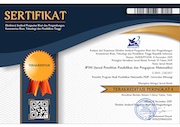TREN PENELITIAN PENDIDIKAN MATEMATIKA DI SOUTHEAST ASIAN MATHEMATICS EDUCATION JORNAL(SEAMEJ) TAHUN 2021- 2022
Abstract
The publication of mathematics education research results has increased and developed from time to time, especially in accredited national journals. This study aims to provide an overview of research trends in the field of mathematics education published in Southeast Asian Mathematics Education Journal (SEAMEJ) and identify future mathematics education research opportunities. This research is a scoping literature review using the five-stage Arksey & O'Malley framework. The review was conducted on 20 articles in the field of mathematics education published in Southeast Asian Mathematics Education Jornal (SEAMEJ) in the period 2021-2022. The result of research on the topic of mathematics education research in the past were dominated by the design of learning model changing towards teaching materials used in learning. Mathematical method will also evolve over time. Mathematics education research in the past still used a lot of quantitative approaches and changed to qualitative approaches. The subjects of mathematics education research were dominated by junior high school students. It is hoped that further research can broaden the observed dimensions, for example on the topic of mathematics education research studies to be able to study ethnomathematics.
Full Text:
PDFReferences
Anggraheni, Kismiantini, & E. (2022). Multilevel Model Analysis to Investigate Predictor Variables in Mathematics Achievement PISA Data. 12(2), 95–104.
Angraini P, D. (2021). The Innovative Learning of Square and Rectangle Employing Macanan Traditional Indonesian Game. 11(2).
Arksey, H., & O'Malley, L. (2005). Scoping studies: towards a methodological framework. International journal of social research methodology, 8(1), 19-32.
Chasanah, A. N. (2021). The Classification of Mathematical Literacy Ability in Cognitive Growth Learning Viewed from Multiple Intelligences Aprilia Nurul Chasanah. 11(1), 1–12.
Firmansyah, A., Qadri, R. A., & Arham, A. (2020). Pelatihan melalui Web Seminar terkait Publikasi Artikel untuk Menembus Jurnal Sinta 2 dan Scopus. 5(2), 131–138.
Jeovanny A. Marticion. (2021). Mathematical Anxiety as Predictor of Learning Motivation Strategies Jeovanny A. Marticion. 11(1), 13–24.
Kuncoro, K. S., Zakkia, A., Sulistyowati, F., & Kusumaningrum, B. (2021). 41 Southeast Asian Mathematics Education Journal, Volume 11, No 1 (2021). 11(1), 41–52.
Levac, D., Colquhoun, H., & O'Brien, K. K. (2010). Scoping studies: advancing the methodology. Implementation science, 5, 1-9.
Madawistama, B. S. & S. T. (2021). Convergent and Divergent Thinking in Mathematical Creative Thinking Processes in terms of Students ’ Brain Dominance Bayu Sukmaangara & 2 Sri Tirto Madawistama Introduction Guilford ( Cropley , 2006 ) introduced convergent dan divergent thinking concepts. 11(1), 53–66.
Matney, G. T., Fischer, C., & Jack L Jackson. (2022). Understanding Students’ Perceptions of Doing Mathematics: A Cultural Comparison. 12(2), 105–124.
Merdekawati, S. (2022). Enhancing Students’ Understanding of Operation in Integers through Joyful Learning with GeoGebraTM Applet. 12(2), 161–170.
Negara Mangkubumi K. (2021). Identifying Ethnomathematics in the Old Mosque of Tosora Negara. 11(2), 107–118.
Nulhaqim S.A, D. (2015). Peranan perguruan tinggi dalam meningkatkan kualitas pendidikan di indonesia untuk menghadapi asean community 2015 33. 0042.
Obed, K. (2022). Vanuatu’s Typical Approach of Mathematics vs the TUAM Approach of Mathematics Kency Obed Sawah. 12(1), 37–50.
Peranginangin, R. B., Panjaitan, S., Hutauruk, A., Tambunan, H., & Artikel, I. (2021). Arah dan Trend Penelitian Pendidikan Matematika di Jurnal Riset Pendidikan Matematika ( JRPM ). 49–62.
Repuya, C. R. (2021). Growth Mindset in Mathematics among Ninth-Grade Students via 5Ps Learning Model Christian R. Repuya. 11(2), 83–94.
Repuya, C. R., & Esterninos, J. (2022). Southeast Asian Mathematics Education Journal Volume 12, No. 1 (2022). 12(1), 11–36.
Rio Mardani Suhardi & Gusnandar Yoga. (2022). The Effect of Implementing STEAM and 4Dframe Learning in Developing Students’ Computational Thinking Skills. 12(1), 51–64.
Rosni Othman, Masitah Shahrill, Roslinawati Roslan, Farida Nurhasanah, N. Z. & D. A. (2022). The Questioning Techniques of Primary School Mathematics Teachers in Their Journey to Incorporate Dialogic Teaching. 12(2), 125–148.
Rudi Rudi, Didi Suryadi, & R. R. (2022). Didactical Transposition within Reflective Practice of an Indonesian Mathematics Teacher Community: A Case in Proving the Pythagorean Theorem Topic. 12(1), 65–80.
Tricco, A. C., Lillie, E., Zarin, W., O’brien, K., Colquhoun, H., Kastner, M., ...& Straus, S. E. (2016). A scoping review on the conduct and reporting of scoping reviews. BMC medical research methodology, 16, 1-10.
Utama, S. &. (2022). Students’ Creativity Profiles in Constructing Independent Gates Learning Activity Using 4Dframe. 12(1), 1–10.
DOI: https://doi.org/10.37058/jp3m.v9i2.7181
Refbacks
- There are currently no refbacks.
©2017 JP3M (Jurnal Penelitian Pendidikan dan Pengajaran Matematika)
Program Studi Pendidikan Matematika
Fakultas Keguruan dan Ilmu PendidikanÂ
Universitas Siliwangi
Jl. Siliwangi No. 24 Kota Tasikmalaya - 46115
email: jp3m@unsil.ac.id
e-ISSN: 2581-2807 ; p-ISSN: 2460-8599

This work is licensed under a Creative Commons Attribution-NonCommercial-ShareAlike 4.0 International License.
StatCounter:
Detail



